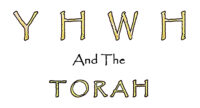1 It is also found in the records that Yirmeyahu the naḇi commanded those that were carried away to take from the fire, as it has been declared,
2 and how the naḇi, having given them the Law, charged them not to forget the Commands of 𐤉𐤄𐤅𐤄, and that they should not stray in their minds when they see images of silver and gold with their ornaments.
3 And with other such words he urged them that the Law should not depart from their hearts.
4 It was also contained in the same writing, that the naḇi, being warned by Elohim, commanded the Mishkan and the ark to go with him as he went up to the mountain where Mosheh climbed up and saw the inheritance of Elohim.
5 And when Yirmeyahu came there, he found a hollow cave where he laid the Mishkan and the ark and the altar of incense, and so sealed the entrance.
6 And some of those that followed him came to mark the way, but they could not find it.
7 When Yirmeyahu saw this, he charged them saying, “As for that place, it shall be unknown until the time that Elohim gathers his people together again and receives them in kindness.
8 “Then 𐤉𐤄𐤅𐤄 shall show them these matters and the esteem of 𐤉𐤄𐤅𐤄 shall appear and also the cloud as it was shown under Mosheh, and as when Shelomoh desired that the place might be qadosh with honour.”
9 It was also declared, that he, being wise, offered the slaughtering of dedication and of the finishing of the Hĕyḵal.
10 And as when Mosheh prayed to 𐤉𐤄𐤅𐤄, the fire came down from the shamayim and consumed the offerings. Even as Shelomoh also prayed and the fire came down from the shamayim and consumed the burnt offerings.
11 And Mosheh said, “Because the sin offering was not to be eaten, it was consumed.”
12 So Shelomoh kept those eight days.
13 The same matters were also reported in the writings and commentaries of Neḥemyah; and how he, establishing a library, gathered together the acts of the sovereigns and the neḇi’im and of Dawid and the letters of the sovereigns concerning the qodesh gifts.
14 Likewise, Yahuḏah also gathered together all those matters that were lost because of the battle we had, and they remain with us.
15 Therefore if you have need of these, send some to bring them to you.
16 Now that we are about to celebrate the purification, we have written to you, and you shall do well, if you guard the same days.
17 We also trust, that the Elohim who delivered all His people and gave them all an inheritance and the reign and the kehunnah and the Miqdash,
18 as He promised in the Law, will shortly show favour upon us, and gather us together out of every land under the shamayim to the qodesh place; for He has delivered us out of great troubles and has qadosh the place.
19 Now concerning Yahuḏah Maqqaḇah and his brothers and the purification of the great Hĕyḵal and the dedication of the altar,
20 and the battles against Antioḵos Epiphanĕs and Eupator his son,
21 and the visible signs that came from the shamayim to those that acted bravely in their honour for the Yahuḏim so that, being but a few, they overcame the whole country, and chased a multitude of foreigners,
22 and again recovered the Hĕyḵal renowned all the world over, and freed the city, and upheld the Laws which were declining, 𐤉𐤄𐤅𐤄 showing favour to them with all kindness.
23 All these things I say, being declared by Yason of Kurĕnĕ in five books, we will attempt to shorten in one volume.
24 For considering the limitless number and the difficulty which they find who desire to look into the narrations of the story, for the variety of the matter,
25 we have been careful that those who read may have delight, and that those who are eager to commit to memory might have ease, and that all into whose hands it comes might benefit.
26 Therefore to we who have taken upon ourselves this painful labour of abridging, it was not easy, but a matter of sweat and watchfulness.
27 Even as it is not easy for he that prepares a banquet and seeks the benefit of others, yet for the pleasure of many we will gladly undertake this with great pains,
28 leaving to the author the exact handling of every particular, and labouring to follow the rules of an abridgement.
29 For as the master builder of a new house must care for the whole building; but he that undertakes to lay it out and paint it, must seek out proper adornments for it; even so I think it is with us.
30 To stand upon every point and go over matters at large and to be watchful in particulars, belongs to the first author of the story,
31 but to use brevity, and avoid much labouring of the work, is allowed to him that will make an abridgment.
32 Here then we will begin the story, only adding this much to that which has been said, that it is a foolish thing to make a long prologue, and to be short in the story itself…
